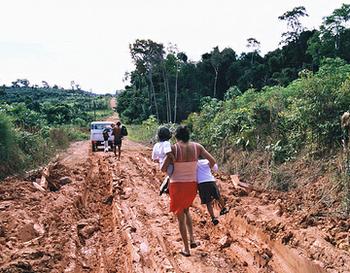 正當各國官員齊聚哥本哈根談判氣候協議時,亞馬遜原住民領導袖關注的是,會議結論將會對他們的族人及傳統領域造成甚麼樣的影響。
正當各國官員齊聚哥本哈根談判氣候協議時,亞馬遜原住民領導袖關注的是,會議結論將會對他們的族人及傳統領域造成甚麼樣的影響。
兩周的聯合國氣候會議預計將通過關於REDD (減少伐木及森林退化造成的排放)的國際體制。REDD對森林的居民帶來希望,同時也是挑戰。
REDD可能成為一套市場機制,透過富國、企業和組織出資讓熱帶國家的人民保護自己的森林,從而應對氣候變遷。
既然亞馬遜河流域約375族的原住民擁有該區域25%-30%土地權,他們似乎將因此機制受益。然而,當地原住民領袖擔憂,氣候談判可能忽略原住民權利;亦或者政府、企業、甚或環保團體可藉REDD為由,接管他們祖先留下的森林。
代表「亞馬遜原住民組織聯盟」(COICA)與會的厄瓜多舒爾(Shuar)族人金提亞賀(Juan Carlos Jintiach)表示,「根據目前亞馬遜流域的狀況,原著民正在觀察REDD發展情況並權衡輕重。他們很擔心,因為某些談判內容沒有保證他們的基本權利。」
他抱怨說,參與REDD談判的亞馬遜河9國政府當中,某些國家近來違反原住民權。他提到今年6月祕魯警方襲擊原住民造成24人死亡;以及最近厄瓜多一名舒爾族人在抗議該國的採礦和水資源法時遭到槍殺的事件。
在伍茲霍爾研究中心擔任資深科學家的奈普斯泰德(Daniel Nepstad)是REDD規範的設計者之一。他表示,儘管REDD存在被濫用的危險,它仍對打擊熱帶雨林砍伐,以及幫助當地人受益於傳統森林管理,提供了最好的選擇。
他提到,最近巴西的進步讓他感到十分鼓舞。他在那裡工作了20多年。五年前,巴西佔全球熱帶森林砍伐面積約四成左右;但自2005年以來,破壞的面積減少了36%。這主要歸功於強化環境法的執行,並建立新的保護區和原住民領域,當然全球經濟衰退也有影響。
亞馬遜盆地南部和東部的原住民領域受到伐木業,農人,牧人和水力發電廠的威脅,抵制這些威脅的在地領袖往往受到暴力報復。
As government officials gather in Copenhagen to negotiate a global response to climate change, Amazonian indigenous leaders are concerned about how the resulting agreement will impact their people and ancestral lands.
Among the expected results of the two-week UN climate change conference is approval of an international regime for Reducing Emissions from Deforestation and Forest Degradation, REDD, which holds both promise and challenges for the forest peoples.
REDD will likely become a market system for wealthy governments, businesses and organizations to pay people in tropical countries to protect their forests, and thereby combat climate change.
The Amazon Basin's approximately 375 indigenous peoples would seem poised to benefit from such as system, since they have title, or legitimate claims to 25-30 percent of that region.
Yet Amazonian native leaders worry that climate change negotiators may ignore indigenous rights, or that governments, businesses, or conservation groups could use REDD as an excuse to take over their ancestral forests.
"With the current dynamic in the Amazon Basin, indigenous people are watching and weighing things. They're worried, because in some areas, there is no guarantee for even their basic rights," said Juan Carlos Jintiach, a Shuar Indian from Ecuador who is representing the Coordinator of Indigenous Organizations of the Amazon Basin (COICA for its name in Spanish) in Copenhagen.
Jintiach complained that the governments of some of the nine countries that share the Amazon Basin, and which will negotiate REDD agreements there, have recently violated native rights. He cited the police attack on an indigenous blockade in Bagua, Peru last June that left 24 dead (ENS, June 5) and the recent shooting death of a Shuar Indian in Ecuador during an Amazonian protest against that country's mining and water laws.
Daniel Nepstad, a senior scientist at the Woods Hole Research Center and one of the architects of REDD, said that despite the dangers of abuse, it offers the best option for combating tropical deforestation and helping native peoples to benefit from their traditions of forest stewardship.
Nepstad said he is very encouraged by recent developments in Brazil, where he has worked for more than two decades. Five years ago, Brazil accounted for approximately 40 percent of all tropical deforestation, but since 2005, that destruction has decreased by 36 percent.
This is largely due to improved enforcement of environmental laws and the creation of new protected areas and indigenous territories, though it also a result of the global economic slowdown.
Indigenous territories in the southern and eastern Amazon Basin are threatened by loggers, farmers, ranchers and hydroelectric projects, and native leaders who resist such encroachment often face violent reprisals.





